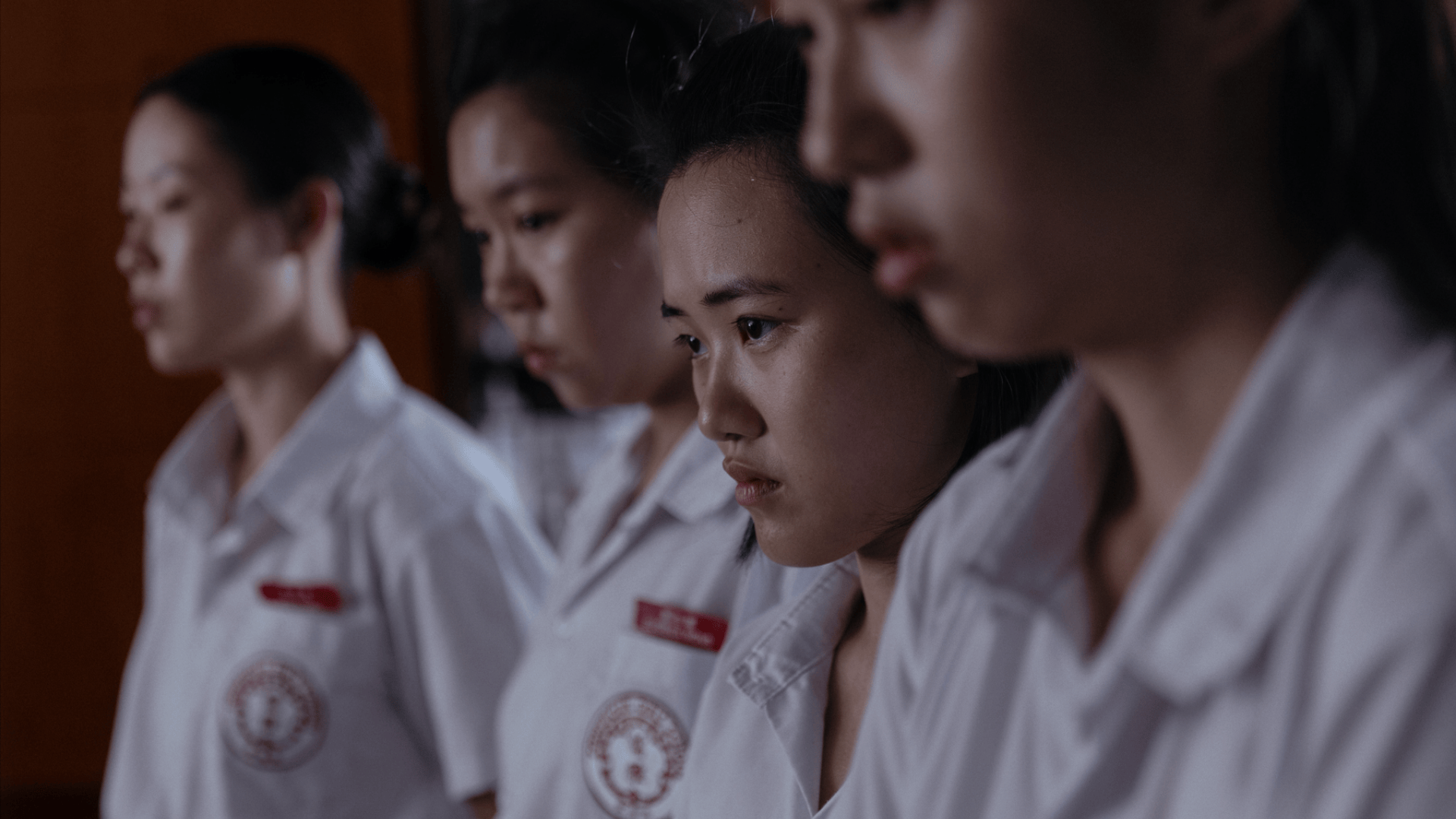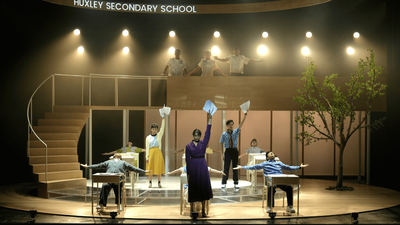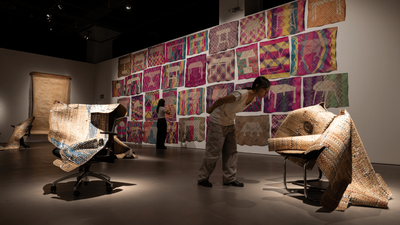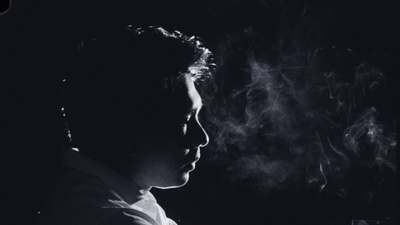When your school uniform is completely white, you have no choice but to be careful. Kopi spills, menstrual blood stains, dirt smudges, and ink blotches are immediately obvious and almost impossible to remove. They stay with you. There’s a perpetual sense of vulnerability humming in the background as you go about your day: as you stand in two rows in the courtyard, as you shuffle to class and settle into that same blue desk and same blue chair, as you sprint to the canteen because it’s Fried Food Friday, as you squeeze onto the bus during peak hour…Because there’s simply no hiding in all white. One morning, I saw a schoolmate’s sports bra flashing lime green under her blouse. Lol, I thought, what made you think you could get away with that? We had uniform checks. Teachers would walk the lines during morning assembly and point out violations: earrings too big, hair tie too colourful, socks too low, skirt too short; “I don’t want to see this tomorrow.”
The girls in “Amoeba” also have to be careful (Spoilers ahead). The film’s protagonist, Xin Yu (Ranice Tay), learns this quickly. On her first day at the fictitious Confucius Girls’ School, she’s dressed in her own all-white uniform (a nudge-wink reference to my very real, very Confucian secondary school?). The principal taps Xin Yu’s pink watch; it is too bright. The principal measures her skirt against a wooden ruler; it is too short. The principal flicks her hair off her collar; it is too long. The principal grabs her bra strap; “it’s white!” Xin Yu protests, but she ends up in line for a replacement bra anyway.
As a new student at Confucius Girls’ School, Xin Yu is not yet familiar with its rules. In a strict environment, there’s a perpetual negotiation at play when it comes to exerting your sense of self. You do this in ways both small (the length of your hair) and large (who your friends are). Over time, your individuality softens, becomes more malleable. You learn when to pull back, and how to push forward. Xin Yu’s classmates—affluent “it” girl Sofia (Lim Shi-An), earnest swim star Vanessa “Nessa” (Nicole Lee Wen) and class clown Eugenia “Gina” (Genevieve Tan)—are seasoned negotiators who recognise something of themselves in the newly-arrived misfit. They invite her to hang out at a construction site next to the main campus building, where the school is building a new pool.
There, away from watchful eyes, the girls are afforded more space to be themselves. They speak louder, tease and chase each other, fling their arms around, hop over puddles, do silly dances, and smoke cigarettes. They’re also capturing their teen selves in creative ways, using a handheld camcorder to document the site and themselves. The camcorder perspective becomes our portal to seeing and understanding who these girls are, away from the weight of expectations imposed on them.
“Amoeba” will have its Singapore homecoming at the 2025 Singapore International Film Festival (SGIFF) after premiering to critical acclaim at the Toronto International Film Festival, one rivalling Cannes as a star-making platform. The film, about four girls forming a gang in a crucible of Confucianism, is Tan Siyou’s debut feature. It’s a coming-of-age story stemming from her own teenagehood: “I felt disconnected from my family, school and the society I lived in, and withdrew to survive. To my childish mind, the amoeba—sexless, mindless, and alone—was like me, swimming in its own sea.” Notably, the film has picked up a number of regional accolades, including a “Best New Director” nomination at the Golden Horse Awards, which signals promising critical success in the Sinophone region. Stories about the intensity of teenage girl friendships have been told before (think “Mean Girls” or, a little closer to home, “Shirkers”), but it is the Singaporean-Confucian world Tan creates that makes “Amoeba” special.
We are diligent in academic pursuits
We are respectful daughters and students of virtue
We strive for excellence, duty and honour
We devote our hearts, bodies and minds
To become our nation’s future leaders
The Confucius Girls’ School song reinforces a key Confucian ethic: “修身齐家治国平天下”. Xiu shen qi jia zhi guo ping tian xia. The cultivation of the self for the harmony of the family in servitude of the nation for peace in the world. In Confucianism, there is no boundary between the spheres of self, family, and nation. They are synergetic, co-dependent organisms that overlap and eat into one another. When the self flourishes, the family is in accord, and the nation prospers. Conversely, when the self is corrupted, the family suffers, and the nation flounders. Xin Yu and her schoolmates are therefore expected to be diligent, virtuous women who devote their hearts, bodies, and minds for the future of Singapore. In return, the nation is obligated to take care of its daughters. In an ideal Confucian society, the state rules like the benevolent patriarch of a large family, protecting its citizens with compassion and care.
Tan Siyou repeatedly reinforces the extent to which the world of “Amoeba” is rooted in traditional Confucian ethics. In Xin Yu’s classroom, phrases from the Confucian Analects are written in Chinese calligraphy and tacked onto the noticeboard. When Xin Yu is sabo-ed into running for class monitress, she repeats the school’s key values in the speech she’s coerced into making for a position she never volunteered for: “Purity. Moral Uprightness. Diligence. Filial piety.” All key Confucian moral values. And if you’re Singaporean, you know Confucianism. You know it intimately and innately, whether you’ve read the Analects or not. Its ethics are baked into our national values and, by extension, the way we live our everyday lives.
The post-independence generation of Singaporean politicians and policymakers both espoused and entrenched these values. In 1977, Chua Sian Chin, then education minister, promised: “While pupils will learn and acquire more knowledge of science and Western technology, and be proficient in the English language, they will be taught not to adopt the lifestyles and values of the West that are alien and pernicious to Singapore society.” Confucian philosophy was enshrined in our national values via the “Our Shared Values” White Paper introduced by Goh Chok Tong, then deputy prime minister, in 1988. Broadly speaking they included “nation before community and society before self”, and “family as the basic unit of society”.
While rooted in Confucian thought, they can also be applied in a secular fashion: “All communities can share these values, although each will interpret and convey the same ideas in terms of their own cultural and religious traditions,” went the White Paper. To prevent our young from being influenced by the insidious, indulgent West, these values were translated into a civics syllabus named “The Good Citizen” (好公民; hao gong min), which had a threefold objective: the self, the family, the nation.
Over time, these values have taken various titles (“Asian values”, “civics and moral education” etc), but our Singaporean moral compass still points to Confucius. Lee Kuan Yew was, of course, proud of the Confucian embrace of the early Singaporeans. “My experience in governing Singapore, especially the difficult early years from 1959 to 1969, convinced me that we would not have surmounted our difficulties and setbacks if a large part of the population of Singapore were not imbued with Confucian values,” he declared in 1994. We did not “believe in the unlimited individualism of the Americans” then, and neither should we now. “I actually think that Confucian values are subliminally what anchors modern Singapore society,” director Tan Siyou told Deadline. “…this concept of society being more important than the individual, is very much a part of Confucianism.” It is within this moral universe that Xin Yu and her friends negotiate their place.
It’s easy to write off Confucius Girls’ School as a microcosm of the strict, authoritarian state. But I’d argue that the symbiotic relationship between the self and society, while suffocating, can also be comforting. There can be genuine feelings of safety and mutual support in conformity, and in the submission of the self to the larger community.
Confucius says the root of compassion comes from our relationship with others. The value of Ren (仁) is foundational to the Confucian society. Ren is often translated as benevolence, but can be understood as a combination of humaneness, love, and respect. It cannot be cultivated in isolation; Ren is the opposite of individualism and can only be nurtured within and in service of larger communal networks. Confucianism, at its core, is not about control. But when Confucian values are distorted for political gain, “the self, originally conceived of as a dynamic centre of expanding relatedness…is taught to value submissiveness [and] degenerates into the passive acceptance of authority,” warns Chinese philosopher Tu Wei-Ming. And that’s what we often see when Confucianism is applied to the real-world governance of a school, society, or state—control sneaks back in.
Control takes many forms in “Amoeba”. It appears in the rigged election that ensures Xin Yu will never be class monitress. In the punishment for her acerbic election speech, where she likens the role to being a teacher’s servant. And in the new role created just for her: the Good Citizen Representative. It’s a brand of brute-force Confucianism that thrusts mandated versions of responsibility, compassion, and self-sacrifice on the girls, rather than allowing them to cultivate Ren on their own.
Xin Yu’s first task is the class show, where the girls are expected to create and perform a skit about Singapore’s origins. While on a “research trip” to the Merlion, they learn about Singapore’s street gang culture from Sofia’s driver Uncle Phoon, played by Taiwanese veteran Jack Kao. He offers them the comfort of Confucianism in a different form: “Being in a gang is about these four words: Loyalty. Righteousness. Brotherhood. Truth.” The girls are bewitched by the story of a female gangster from Uncle Phoon’s kampung, a clever, well-respected leader who defended the rights of others, no matter the cost. They’re excited now. They didn’t know women could be gangsters. “Then we are a gang too!”
Cut to a shaky-cam shot: the four girls dancing around Sofia’s room, a YouTube video blaring gang chants set to a manyao beat. This could be a scene straight out of Royston Tan’s cult film “15”, also about teens’ induction into a Singaporean gang—except that these are girls from an elite school set on the path to Singaporean success, not falling through the cracks. The girls give the camera the finger, scream profanities into a mic, shoot a toy gun, and bare their teeth. Smash cut to the girls seated on a plush sofa around a shiny coffee table smiling demurely at Sofia’s mother. “Thank you auntie Angelica!” they chorus, while passing around plates and forks as they tuck into delicate tea cakes; four amoebas, changing their shapes by extending and retracting temporary projections of themselves. Ranice Tay, Lim Shi-An, Nicole Lee Wen and Genevieve Tan, collectively making their feature film debuts, are convincing teenagers. Each of them fulfils a different trope (awkward newbie/“it” girl/star athlete/boisterous goof) while lending an authenticity to their characters and the chemistry between them. They draw from backgrounds in theatre and short film to portray a teenagehood that is equal parts naive, vibrant, awkward, and playful—managing to make it feel just as messy and exuberant as our own.
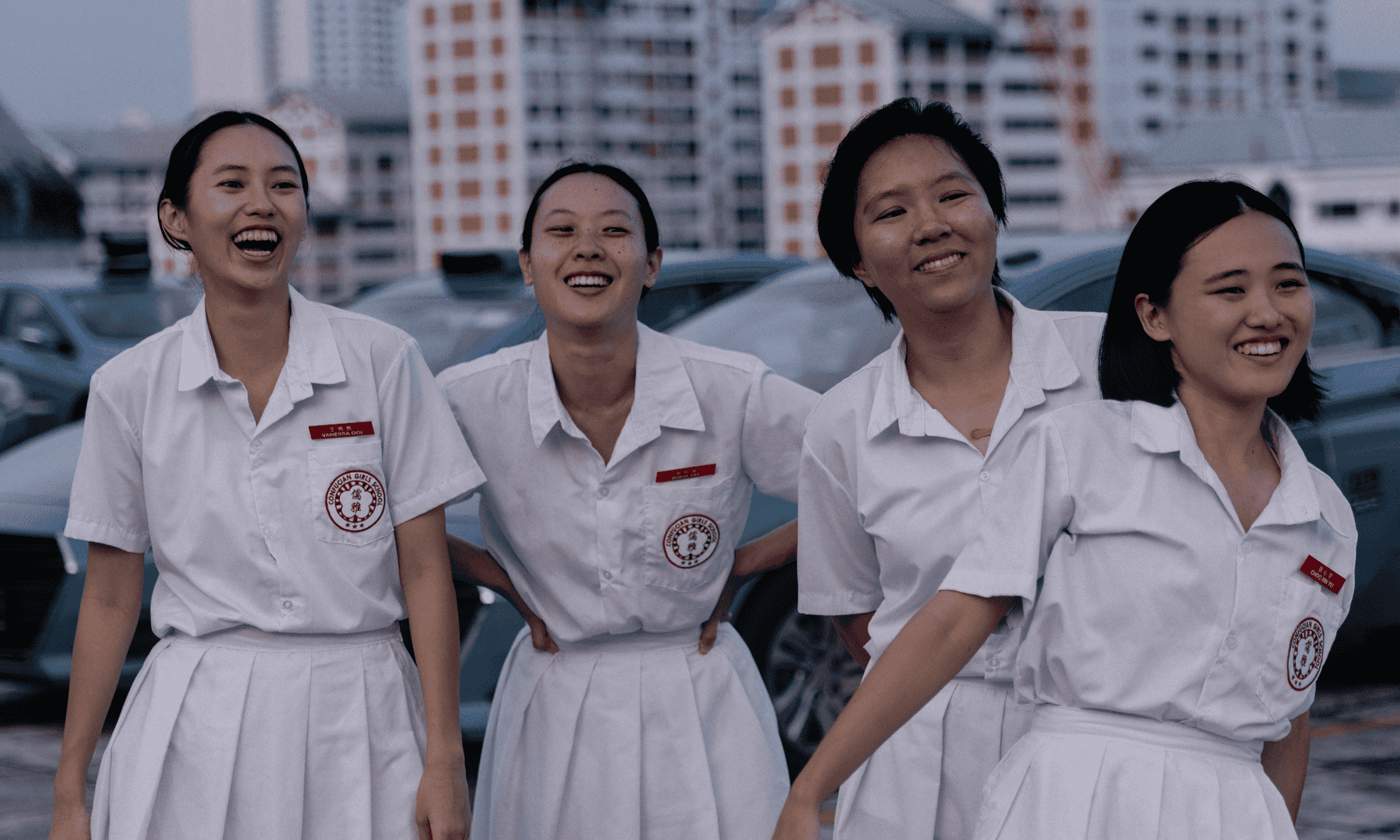
Not all teenage rebellion is skipping school and casual sex. In more constrictive cultures like that of Confucius Girls’ School, rebellion can wander down quieter, more private alleys. On the surface, Xin Yu and her friends are “good” girls—diligent students and respectful daughters. But drill down and, in the damp bowels of a construction-site cave, the girls are safe to divulge the “bad” ways in which they push back. Rebellion can be experimental: Eugenia sniffs some glue. Rebellion can be frivolous: Sofia steals peach gummies just to throw them away. Rebellion can be self-flagellation: Nessa dreams about drowning every night before a swim competition. Rebellion might also turn violent: they indulge in a shared fantasy of destroying their figures of authority. “Blow their heads off!” “Kill them all!” “Die!”
I don’t believe the girls mean it. They’re not dangerous delinquents; their rebellion is clumsy and somewhat cringey. But I can understand the momentary pleasure of an exaggerated fantasy, especially if you feel suffocated by the pressures of how to act, how to dress, and how to be—while subject to constant surveillance to make sure that you are, in fact, succeeding at all of those things. When even your bra is checked and policed, what remains yours? Rebellion, it turns out, can also be deeply intimate.
Cut to Xin Yu’s bedroom. It’s dark. Nessa, holding the camcorder, traces the contours of Xin Yu’s prone body on the bed. You can feel their unexpressed desire seeping through the screen. They are trying to gather filmic evidence for the ghost Xin Yu believes haunts her room. But these moments are pregnant with what is left unsaid. For a moment, we can’t tell if the girls are flirting or playfighting as they make kissy faces at the lens and prance around the room; the camcorder becomes both the object of and intermediary for the girls’ desire as it changes hands. Nessa grabs Xin Yu’s wrist, trying to snatch the camcorder from her. Xin Yu falls back on the bed. Ranice Tay and Nicole Lee Wen portray the girls with a longing that has not yet crystallised into lust. Both actors convincingly capture the moment yearning is born—ripe and powerful but still in its fragile shell. Suddenly, light floods the room. It’s Xin Yu’s mother. Any queer desire between Nessa and Xin Yu now remains merely a suggestion. “I was more interested in exploring this kind of fluidity and formation, because they are not fully formed yet,” Tan Siyou explains.
But the seed of intimate rebellion grows despite the Confucian concrete it’s found itself embedded in. Earlier in the film, we watch Xin Yu desperately recite the Buddhist heart sutra when she’s convinced a ghost is pacing around her bed. “The body is emptiness. Emptiness is the body.” Now, we watch her swaddle that same body in Nessa’s swim team jacket, pressing its sleeves to her nose, inhaling deeply. The individual takes the group camcorder for her own. She records herself gyrating with the jacket on, seemingly drunk on Nessa’s scent. The body, despite its discipline of emptiness, is full of secrets.
And when the camcorder disappears from Xin Yu’s safekeeping, these secrets threaten to spill over. The Confucian institution will not allow individual desire to take precedence over the collective—or, rather, the collective’s reputation. Nessa puts it plainly: “If my coach sees those videos, I’m dead.”
Death takes the form of the principal’s office. The bedazzled camcorder betrays them: it transforms from a neutral documenter to a loaded surveiller. Threats of police reports are parried by wealthy and powerful parents. Punishments are also meted out accordingly: those with the least to offer shoulder the most of the blame. Oddly enough, it isn’t the nature of the intimate rebellion that ruffles the most feathers—it’s the revelation that students were rebelling in the first place. The only acknowledgement of Xin Yu and Nessa’s “illicit” video is a new school rule: no hugging. No one asks why the girls felt the need to emulate gang culture in the first place. Neither do we see any moment of tenderness or genuine concern from the institution meant to look out for its own. Ironically, Confucius Girls’ School deals with the girls’ “disobedience” in a very un-Confucian way. Confucian thinkers have affirmed that citizens do have a “right of rebellion if the state does not fulfil its role”. And Confucius himself condemned blind submission to authority, declaring “And how could a subject be loyal if he follows the order of the ruler? One can only speak of filial piety and loyalty after one has examined the reasons why [emphasis mine] they follow the order.” Rebellion is not antithetical to Confucianism. It’s antithetical to authoritarianism.
Part of me wishes we were privy to a more multi-dimensional, nuanced portrayal of Confucian authority. We know what Confucianism asks of us, the good daughters. But what about what we’re owed by the benevolent father? I find it difficult to believe the relationship between teacher and student can only be dominated by fear, oppression, and control; the staff of Confucius Girls’ School come across as almost cartoonishly evil. Xin Yu, Eugenia, Sofia and Nessa need understanding, respect, and Ren. But based on what we see in “Amoeba”, they receive none. Tan Siyou paints a bleak Confucian world with a deadbeat dad.
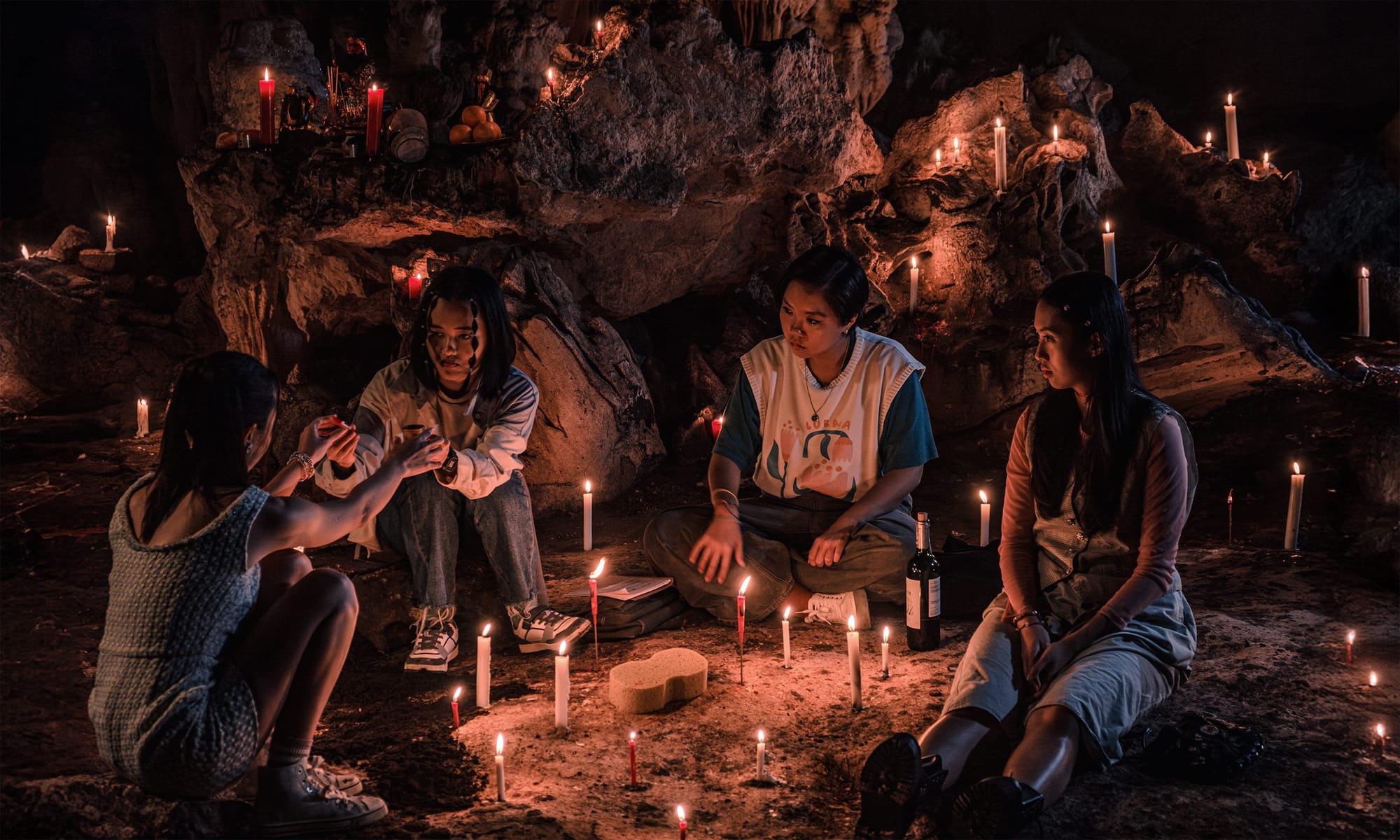
In the construction site cave they’ve co-opted as their own, the girls detach from their Confucian authority figures and write their own pious contract of loyalty. Candles flicker in concentric circles around them, and they jab incense sticks into a styrofoam brick as they make a pact: they’ll go to the same junior college after graduating. But which one? They eventually settle on a less elite school, one that comes with a guarantee that they’ll all get in. The retired girl gang will swap their all-white uniform for a “fucking ugly” one, but it feels like trading up; the girls are attempting to prototype a new brand of Confucianism. Sophia could easily get into the country’s top school, the prestigious Marymount Junior College, but she seems persuaded (or peer pressured) by the promise of friendship. They seal the pact with a blood oath.
Smoke spirals up as Xin Yu dramatically recites, in Mandarin, the consequences of violating this oath. A street gang, a secondary school clique, a nuclear family, a school like Confucius Girls’ School—they’re not so different after all. They share an obligation to respect hierarchy, and to follow collectively established rules (“If anyone breaks this blood oath, she will die in a month from drowning and her bones will turn to dust”). In return, members enjoy a sense of loyalty and belonging (“If any member of this gang finds herself in difficulty, all will rush to her aid”). Tan Siyou’s nod to moralistic Asian modes of storytelling is not lost on me; for a moment, I am a child again, running through the dark tunnels of Haw Par Villa after my mum pointed towards a figurine getting its tongue cut off (“If you lie, this will happen to you too”). When you flout the rules, there will be consequences. You need to make a choice: bend, and be absorbed back into the collective—or break away, alone.
Sofia breaks. She gets a place in Marymount JC, and decides she’ll stick to the tried-and-tested path to prestige. “I’m not going to be dragged down!”, she explodes when confronted. The girls’ intimate rebellion may have shown us how institutions react to the betrayal of their subjects, but there’s nothing quite like the betrayal of the institution of friendship. In “Amoeba”, we see that rebellion isn’t always a strategy of the oppressed. Rebellion can also occur within the suffocating norms of intimate relationships, where genuine care exists (or once did).
The film culminates in the girls’ O-Level oral examination. Here comes the great leveller, in the form of a standardised test. We watch each member of the girl gang face the same dilemma: conform, or give in? Nessa and Sofia bend, giving near-identical answers, clearly prepared by the same tutor. Xin Yu breaks. “I find myself questioning what is real. But how do we know what is real…when all we’re meant to do in an exam is to tell you how the Merlion represents prosperity, change and a national identity when we don’t even believe a single word of it?”
On the one hand, we see a young woman choosing to prioritise the self over the collective by honouring how she really feels instead of performing what is expected of her. But we can also interpret her decision as self-sabotage. Xin Yu’s no dummy. She knows the significance of this exam, and how her unvarnished answer might negatively affect her grade, which school she goes to, and perhaps even the direction of her future.
In “Amoeba”, we see how rebellion can breed in private spaces. But this final scene offers another alternative: rebellion can turn inward. In the Confucian moral universe, when you destroy the self, you destroy the collective. The students of Confucius Girls’ School are repeatedly reminded that they are the future of Singapore. As bright girls in an elite school, they are our nation’s most precious resource; there is an inalienable obligation to fulfil their potential in service of the nation. Is there a more effective way of rejecting this obligation than destroying the resource from the inside? Xin Yu, like Tan Siyou’s teenage self, ends up “swimming in [her] own sea”. She is just as alone as she was in the beginning of the film.
On screen, we see youth that is soft and gelatinous. The girls pull back and push forward, conform and rebel, come together, then fray and fall apart. In “Amoeba”, there is no space for amoebic squishiness. Theoretical Confucianism moves outwards (from the self, to the family, to the nation), but in practice, Confucianism also pushes downwards (repress your ego, your individuality, your unruly desires). Rebellion descends from a gang above ground to an underground cave and, finally, drills down into the deep recesses of the self. “Amoeba” shows us that in a world of corroded Confucianism, rebellion can’t spill out onto your all-white uniform. But you might be able to nurse that fierceness by holding it close in the spongy chambers of your wild, beating heart.
Jean Hew is a writer, researcher, and yoga teacher. She is motivated by curiosity and deeply invested in philosophy, art and celebrity gossip.
“Amoeba” will premiere in Singapore at the 2025 Singapore International Film Festival on November 29th and December 1st. Tickets are sold out, but you can try your luck in the Rush Queue. No-show seats will be released 10 minutes after the screening start time to those in the Rush Queue on a first-come, first-served basis. More information here, under the FAQ tab.


